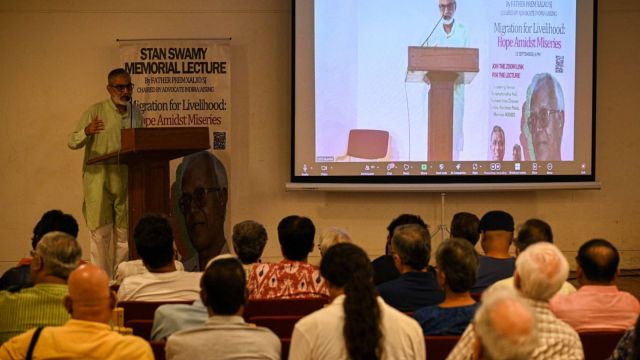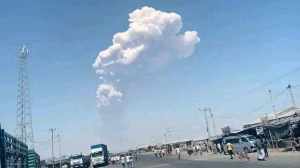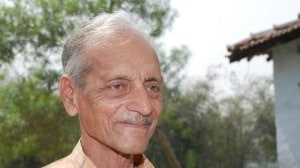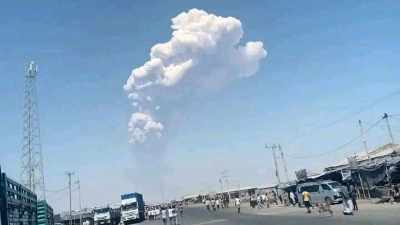Stan Swamy Memorial Lecture: Speakers stress on struggles of tribal, migrant communities
Senior advocate Mihir Desai, who has represented human rights cases in the Bombay High Court and Supreme Court, reflected on Stan Swamy’s legacy
 Organised by over 55 civil society groups, the event drew both in-person and virtual audiences and paid tribute to the late Jesuit priest and tribal rights activist Stan Swamy (Express photo/Sankhadeep)
Organised by over 55 civil society groups, the event drew both in-person and virtual audiences and paid tribute to the late Jesuit priest and tribal rights activist Stan Swamy (Express photo/Sankhadeep)Speakers at the Stan Swamy Memorial Lecture, held on Saturday at Nariman Point after being cancelled earlier by St Xavier’s College, stressed on the ongoing struggles of India’s tribal and migrant communities. Organised by over 55 civil society groups, the event drew both in-person and virtual audiences and paid tribute to the late Jesuit priest and tribal rights activist Stan Swamy. It also addressed urgent issues related to migration, social justice, and human rights.
Father Prem Xalxo SJ, associate lecturer at the Pontifical Gregorian University in Rome, delivered the keynote address. “Migration is migration. It is what makes us, and it is the story of hope amidst misery for countless tribal families pushed to cities for survival,” he said. He highlighted the difficult realities faced by tribal migrants, saying, “They are uprooted from close-knit communities and placed alone in unfamiliar lands, compelled to adjust to new, often harsh realities. Many work in homes where respect for their rights and dignity is fragile or absent.”
Father Prem underscored the need for collective empowerment and community solidarity. He stressed that migration should not be viewed solely as distress but also as a survival strategy rooted in hope. He further advocated for creating support systems that affirm the identity and rights of migrant workers, highlighting that “helping these communities see themselves with dignity is crucial to their empowerment.” Including this perspective would enrich the narrative by balancing the harsh realities with the enduring spirit and agency of those whom Stan Swamy dedicated his life to defending, he said.
Senior advocate Mihir Desai, who has represented human rights cases in the Bombay High Court and Supreme Court, reflected on Stan Swamy’s legacy: “Stan Swamy fought for the marginalised like no other. He brought in legislation to protect the rights of tribals and pressed relentlessly for the implementation of the Forest Rights Act. His activism did not end with his death — it is now a call for ongoing social resistance.”







